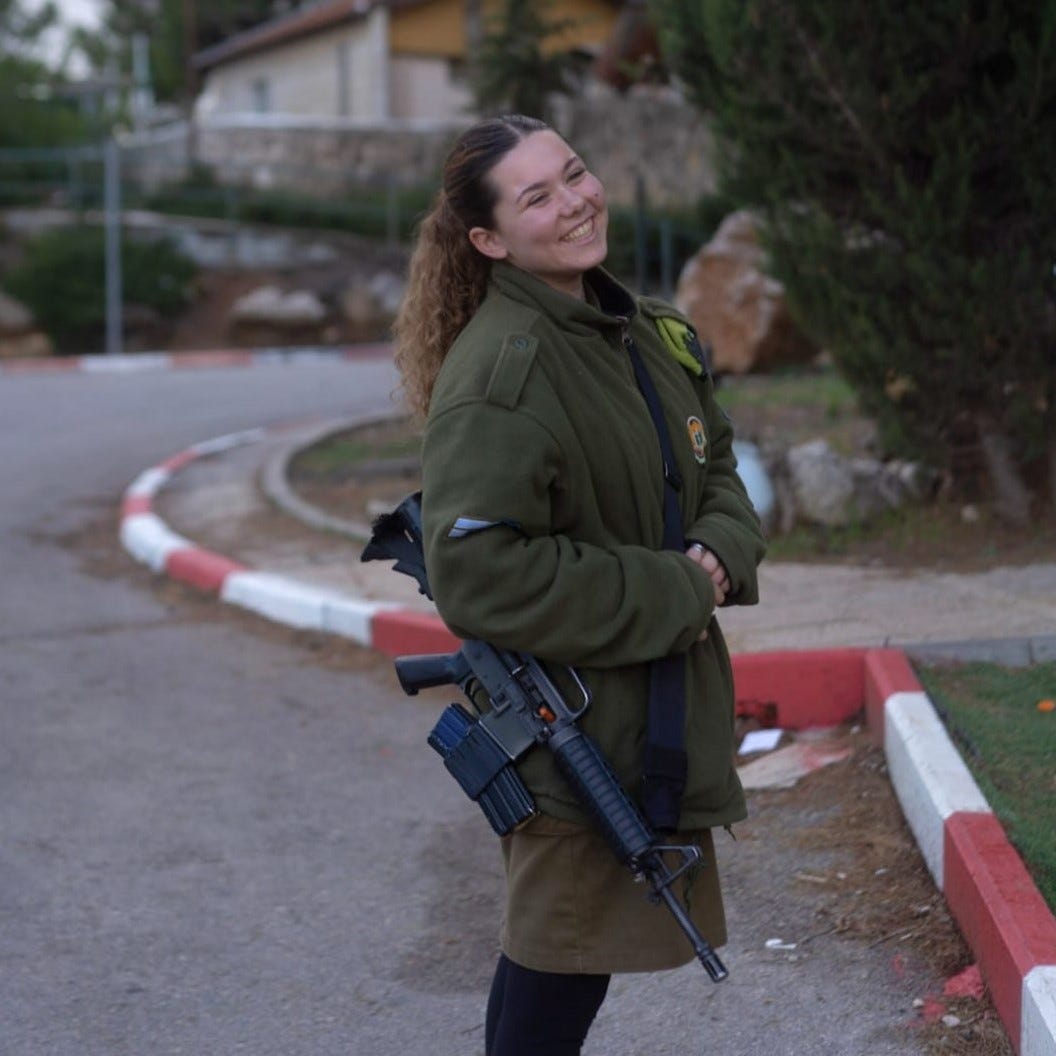Commander Slifkin's Barbeque
A heartwarming but challenging event
(Photo credit: Menachem Geisinsky from the “Smiling Soldiers” project)
Last Shabbos, someone in my community told me that the war has strained her relationships with her neighbors. She’s aware, of course, that charedim don’t serve in the IDF. But those in Jerusalem or Bnei Brak or Kiryat Sefer are a remote statistic which doesn’t affect her emotionally. It’s when she sees her neighbor’s sons coming home from yeshiva every Shabbos, while her own sons are in Gaza and she hasn’t even been able to hear from them, that it stirs up frustration and resentment.
My daughter, a mefakedet (commander) in the IDF, feels the same way. She’s having a hard time in the army - there are religious, emotional and physical challenges. But she is painfully aware that she has it relatively easy compared to many of her friends. One solder that she worked with has already been killed. And she has many friends who were sent to Gaza. It’s hard for her when she comes home to Ramat Beit Shemesh and sees guys that she grew up with in our old quasi-charedi shul, and who left the South so that they could study in yeshivah elsewhere with no interruption to their comfort and security.
Nevertheless, sometimes she puts those feelings aside. Last week an American-Israeli charedi group came to my daughter’s base, to provide a barbecue and entertainment. As my daughter said, it’s impossible to feel negatively towards people who are going out of their way to bring you food and music. And such people, who care enough about the IDF to travel out to bases and bring food, are miles ahead of 98% of people in the charedi community. My daughter was really enjoying herself, singing along with the music that she grew up with (much to the surprise of both the other soldiers, who could barely discern that these songs were actually Hebrew, and the visitors, who couldn’t understand how an IDF soldier knew American yeshivish songs). And she was thrilled when Lipa Schmelzcer showed up and sang for her personally (as you can watch in a video at the end of an earlier post).
One of the women who arranged the barbecue struck up a conversation with my daughter, and asked her what she does. My daughter explained that she is a mefakedet, in charge of a group of beginner soldiers. The woman replied, “Oh, I’m also a mefakedet!” Confused, my daughter asked what she meant. The woman explained that she’s a mefakedet of her children.
My daughter wryly mentioned that it’s not exactly the same. But the woman wasn’t joking and didn’t back down. She said, “Which do you think is more difficult, carrying a gun all day or carrying a baby?”
At this point my daughter started to get upset. She pointed out that she also plans to spend many years carrying babies.
The woman responded that everyone has their role, and her own role is to do chessed for soldiers. My daughter pointed out that one can do both, and that her own family and community is involved extensively in chessed, be it packaging food for soldiers or helping with the farms in the South that need workers, and that this does not mean that you can’t also serve in the IDF.
The discussion continued with a man from Ramat Beit Shemesh, who explained to my daughter that he doesn’t send his children to the IDF because it’s like walking at the edge of a cliff, in terms of the spiritual dangers. My daughter said, “But what if Hashem commands it?” and he was surprised; he didn’t think of protecting Israel as being an obligatory mitzvah. She also asked him why she and all her friends have to walk at the edge of the cliff, and risk those dangers, while his children don’t. (She added that if there were more religious Jews in the army, her religious challenges would be lessened.) He didn’t have a response, but to his credit, at least he said that he would think about it and discuss it with his family.
At the end of the evening, my daughter returned to her bunk, with mixed feelings; happy about the event, but frustrated about those who negate the need to serve. The other soldiers asked why she was upset, but she wouldn’t tell them; they are secular and wouldn’t properly grasp the difference between different types of Orthodox Jews.
The challenge we face is considerable.
NOTE: I will be visiting New Jersey for Shabbat December 23, and I am available to speak on Sunday December 24th. I’m also available as scholar-in-residence in NY/NJ for Shabbat February 17th and in Florida for Shabbat February 24th. Please be in touch if you are interested in arranging an engagement.




Hooray! The evil Haredim again! You had two consecutive posts on other stuff so I was starting to get nervous... Power to ya, rabbi. Get 'em!
Reading this, and your daughter's post, brought tears to my eyes. You and she are a true inspiration. We wish you and she (and your wife, who no doubt played a big role in this as well) only bracha viHatzlacha and much continued nachat.